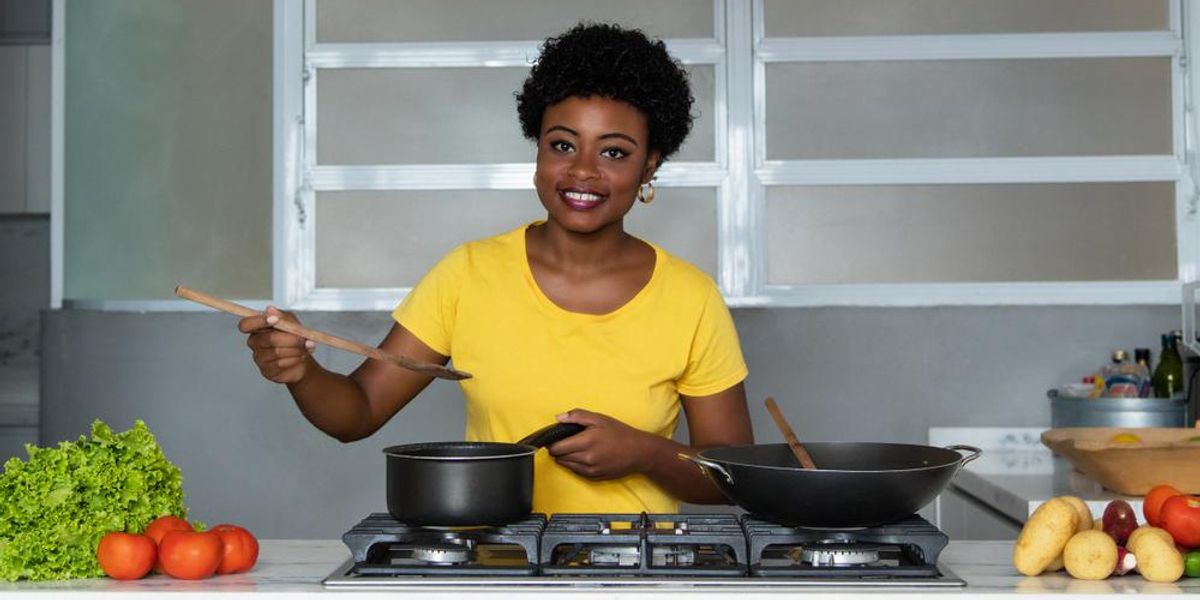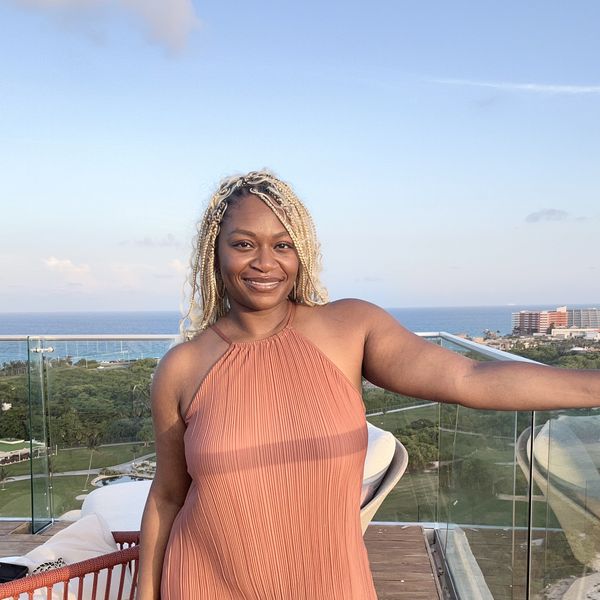
9 Black Chefs Changing The Food Game
We all love a good plate of food, and whether you're a vegan, vegetarian, pescatarian, or still deciding, you can't deny the heavenly feeling of sitting down to eat a well-prepared meal. As black women, we have always been innovators in the kitchen, whether it's making leftovers seem like they're brand new, creating fabulous meals out of bare-bones groceries, turning cooking savvy into successful businesses, or changing the food game altogether. Here are 9 black female chefs who have done just that, using their culinary prowess to win in business and in the kitchen:
Sunny Anderson
A military vet, she's got more than 15 years under her belt serving as a professional chef, and she's hosted several hit shows including Food Network's Cooking for Real, and The Kitchen. She's also a New York Times best-selling cookbook author and creator of Infadium, a fun snack holder sold at Party City and on Amazon. Her dishes combine everyday food with the diverse tastes and flavors of her international travels.
Kelis
We all know her as the Grammy-winning, gloriously curly-haired singer who had Neptunes-produced hits, but Kelis has done a total career change as a fab farmer and chef. She hosted Netflix's Cooked with Cannabis, launched her own line of food products called Bounty & Full, wrote a best-selling cookbook, and has expanded the brand to include Gold Mine boxes that literally sell out in minutes after being announced via her IG page. Kelis favors unique ingredients that reflect her Puerto Rican and African-American background.
Kardea Brown
Kardea Brown is the host of Food Network's Delicious Miss Brown, where she shares southern cuisine from her South Carolina kitchen. Of Gullah/Geechee descent, Brown infuses the culture of African-Americans of the coastal region like beef and okra stew, Gullah red rice, and "Charleston-style" shrimp and grits.
Nyesha Arrington
Nyesha Arrington brings her Afro-Korean heritage to the dishes she creates and was introduced to foods like bulgogi, octopus, and kimchi at an early age, helping to diversify her palate. She's appeared on Top Chef, opened two restaurants, LA: Leone and Native, and has done successful international pop-ups. She now runs her own full-service chef consulting and catering service.
Mashama Bailey
A James Beard award-winning chef, Mashama Bailey brings Bronx swag and grit to the South with her dishes that incorporate history and culture. She's the executive chef and partner at The Grey, a restaurant in downtown Savannah, GA that is built inside a 1938 art deco Greyhound Bus terminal. The dishes include traditional Sunday dinner classics with a refined twist that might inspire you to take your own fried chicken meal up a notch.
Nina Compton
Nina Compton is another alumnus of Top Chef, and her roots go back to the shores of Saint Lucia. Compton, also a James Beard award-winner, served as a chef in some of the best restaurants in New York and Miami before opening her own restaurant in New Orleans called Compere Lapin, offering flavors of the Caribbean, Italy and France on the menu. She then went on to co-found Bywater American Bistro in New Orleans. She also serves as the Culinary Ambassador of Saint Lucia.
Kia Damon
Kia Damon came on the scene as a young self-taught phenom who made headlines at 24 when she became head chef at the chic New York eatery Lalito. She's also dominated Chopped this year and became the first culinary director at Cherry Bombe magazine. She also hosts an IG-based show called "On the Line" where she highlights leaders in the culinary space as well as culture's link to cuisine, activism, identity, and lifestyle issues. On top of that, Kia has launched Auxilio Space, a New York-based community platform that provides services, support, and jobs for queer, trans, Black and indigenous communities, in collaboration with nightlife and hospitality leaders Zacarías González and Mohammed Fayaz.
Kiki Bokungu Louya
Born and raised in Detroit with Congolese roots, Kiki Louya is the founder of two award-winning food concepts called Folk, and The Farmer's Hand that supported fair treatment of food and farm workers. She also founded Nest Egg Detroit, America's first all women-owned hospitality group.
Mariya Russell
As lead chef at Chicago's Kikko, Mariya Russell made history in 2019 as the first black female chef to head a Michelin-starred kitchen. The restaurant is special in that it's an omakase, a Japanese concept where the sushi chef decides what you will eat and provides multiple courses of delectable goodies, making for a unique dining experience. She's known for using ingredients such as shiokoji, a fermented liquid used in sake, and creative dishes like pickled green almonds, house-made tofu, and dashi.
Are you a member of our insiders squad? Join us in the xoTribe Members Community today!
Featured image by Shutterstock
- Black Female Chefs Find a Sweet Spot in OWN's First-Ever Food ... ›
- This restaurant is paying homage to Baltimore's iconic lake trout ... ›
- 11 black women chefs to follow on Instagram - 21Ninety ›
- 12 Local Black Female Chefs, Restaurant Owners, and Food ... ›
- Southern Comfort: Black Female Chefs, Mixologists Featured at ... ›
- 16 Black Chefs Changing Food in America - The New York Times ›
- 7 Black Female Chefs You Oughta Know - Essence ›
This article is sponsored by Hulu.
UnPrisonedhas returned for its highly anticipated second season, delving deeper into the complex dynamics of the Alexander family.
The series premiere comes a year after its debut season garnered rave reviews from fans and critics and earned record-breaking ratings for Hulu's Onyx Collective brand. UnPrisoned's success can be attributed to its raw, relatable themes and comedic appeal.
Inspired by creator Tracy McMillan's life, the show follows Paige (Kerry Washington), a therapist and single mother whose life takes an unexpected turn when her father, Edwin (Delroy Lindo) --who was released from prison-- moves in with her and her teenage son, Finn (Faly Rakotohavana).
Throughout UnPrisoned's first season, viewers witnessed how Edwin's incarceration deeply affected Paige's life and relationships. In the series, Paige unpacks her trauma through interactions with her inner child and her online followers. Meanwhile, Edwin is overcoming specific struggles with his own past that led to his life of crime, including a dysfunctional upbringing and his mother's arrest. As the Alexanders attempt to reconcile, new challenges arise.
This new season promises to further explore their unconventional family dynamic. Here are several compelling reasons why season two of UnPrisoned should be on everyone's watchlist.
The Alexander Family Life Is Still In Shambles
UnPrisoned's second season resumes where the series left off, with Paige grappling with the fallout from her troubled therapy practice and Edwin navigating life independently after moving out. Meanwhile, Finn faces his own challenges. The teenager is battling anxiety and seeking information about his father—a topic Paige avoids discussing.
The Alexander Family Are Attending Therapy To Resolve Their Underlying Issues
Amid the chaos in their lives, the Alexander family decides to mend their bond by confronting their past traumas. They seek professional help and attend therapy sessions with a “family radical healing coach,” played by John Stamos, a new cast member. This collective effort aims to unravel the complexities of their shared history and strengthen their relationships.
The process of unraveling each character's internal conflicts and their potential impact on future relationships may clash with Paige's textbook therapy approach. While Paige is used to being in the therapist's seat in both career and family, this forces her into the unfamiliar role of a patient during therapy sessions. This shift would compel her to look in the mirror and try a radically different approach.
The Alexander Family Learned A Big Lesson During A Therapy Session
In therapy, the Alexanders are tasked with addressing their individual traumas to salvage their remaining relationships. One of the family therapist’s eccentric suggestions was an exercise involving a family wrestling match. During this session, Paige faces tough questions about her refusal to share information about Finn's father.
While it's unclear whether this scene is reality or fantasy, the image of the family duking it out in the ring certainly makes for hilarious yet compelling television.
Paige Tries Dating Again Following Failed Relationships
Amid her life's chaos, Paige decides to step back into the dating field. However, her many attempts have left her with mixed results. The dating apps have turned out to be a fail, and an outing with her ex Mal (Marque Richardson), who is also her father's parole officer, doesn’t go quite as expected after he brings an unexpected guest – his new girlfriend.
The situation takes an awkward turn when Mal's new partner learns why the former couple split, partly due to Paige's self-sabotage.
UnPrisoned Is A Perfect Balance Of Comedy And Drama
As a dramedy, UnPrisoned takes a comedic approach to its heavy subjects. The show takes us on a ride with Paige's dating misadventures and navigating a friendship with her ex.
Other lighthearted moments include Edwin's attempts at CPR based on online videos and, of course, the antics of the Alexander family's unconventional new healing coach.
The second season of UnPrisoned is now available on Hulu.
UnPrisoned | Season 2 Trailer | Hulu
Feature image courtesy
Blair Underwood Initially Turned Down 'Sex And The City' Because 'It Was About How Samantha Was Fascinated By Dating A Black Man’
Actor and heartthrob Blair Underwood is opening up about why he turned down Sex and the City the first time he was offered a role. Many fans of the HBO series may recall Blair's time on the show in which his character was dating Miranda (Cynthia Nixon). However, he was previously offered another role where his character would date Samantha (Kim Cattrall).
During his interview with AV Club, the Set It Off star revealed that he was uncomfortable with the initial offer due to the character's fascination with him being a Black man.
“I actually did say ‘no’ the first time,” he said. “The first time they had offered the role, to be honest with you, it was about how Samantha was fascinated by dating a Black man and wanted to know if, uh, all of the rumors were true about our anatomy! And I said, ‘Listen, I’m honored, thank you, but I just don’t want to play a character based on race, on curiosity about a Black man.'”
But that didn't stop them from reaching out again. This time he was offered to play Dr. Robert Leeds, the love interest to Miranda and he decided to go for it. "So they were nice enough to call about a year later, and I said, 'Well, is it gonna be about race?' And they said, 'No, no, no, we’re not even gonna mention race!' And I think it really did only come up maybe once," he recalled.
"It did five episodes, and I think Samantha mentioned it once, saying something about 'a Black doctor' that Miranda was dating. And that’s really been a consistent thing in my career: not wanting to be boxed as 'the Black guy.'
"I’ve had that conversation with many producers along the way, and they were so great. They said, 'No, he’s just a doctor who Miranda meets in the elevator, and they have a nice little fling.' And it was amazing."
Blair has had a wide-ranging career playing everything from a lawyer on L.A. Law to playing Madame CJ Walker's husband on Self Made: Inspired by the Life of Madame CJ Walker. And during his interview, he revealed another role that he initially turned down, Set It Off. The movie, which is considered a classic in Black culture, stars Queen Latifah, Jada Pinkett Smith, Vivica A. Fox, and Kimberly Elise. Blair's character, Keith, played a banker and love interest to Jada's character, Stony.
He explained why he said no at first and eventually accepted the offer. "I had initially said “no” to that. Because I was playing this historic, iconic African-American historical figure in Jackie Robinson, and the time, y’know, there was Boyz N The Hood, and Menace II Society was out there, and I’d finished playing this noble Negro… [Laughs]," he said.
"And I’m reading the script, and there’s a scene where Jada Pinkett’s character—Jada Pinkett-Smith now—was going to sell her body so she could make some money to send her brother to college. And I remember, honestly, I threw the script across the room. I was, like, “I don’t want to do this. I want to do something uplifting for the Black culture and Black characters, and I don’t know if I want to see this.”
After a conversation with the movie's director F. Gary Gray and the actor's manager encouraging him to finish reading the script, Blair had a change of heart. What he first thought about the movie turned out to be totally different.
"So I finished the script, and I saw that the character they were asking me to play was really the love story in the midst of all of this turmoil of all of these characters, the four ladies: Queen Latifah, Vivica Fox, Kimberly Elise, and Jada," he explained.
"It was so well-written, it was such a great platform for them. And to be able to play the love story and the storyline that gave Jada’s character a leg up and a way out of this world, something to hope for, to wish for, someone to love her… I said, 'You know what? I’d like to be a part of that.'
"And I’m so glad I did, because that film resonates to this day. People all the time come up to me and say that they love that movie. So I’m glad that I did it."









